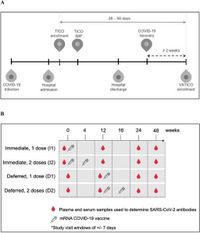In an intriguing new study, researchers have explored the dynamics of antibody responses to SARS-CoV-2 vaccination in individuals who recovered from COVID-19. Conducted through the VATICO clinical trial, the research involved 66 participants from various countries, including the US, Spain, Uganda, and Switzerland, focused on understanding whether the timing of vaccination and the number of doses influences immune responses.
The study randomized participants into two groups: those receiving immediate vaccination (within an average of 68 days after infection) and those receiving deferred vaccination (151 days post-infection). Each group was further divided to receive either one or two doses of mRNA vaccines (Pfizer-BioNTech or Moderna). Despite expectations, the results showed that neither the timing of vaccination nor the dosing schedule significantly affected antibody levels at the 48-week mark.
According to the authors of the article, the findings suggest that early vaccination after recovery from COVID-19 might enhance adherence to vaccination regimens. In the study, adherence rates were notably higher in the immediate vaccination group, emphasizing the potential importance of timely immunization in reducing missed vaccination opportunities.
“Furthermore, our results indicate that individuals who received one dose after recovering from COVID-19 might experience comparable antibody responses to those who received two doses,” the authors wrote, highlighting a critical observation regarding hybrid immunity.
While the study was curtailed in size due to the termination of the broader TICO trial from which participants were drawn, the researchers noted that high seroprevalence and existing vaccination rates make it challenging to conduct comparative studies in the current population. They emphasized that future research should validate these findings on larger, more diverse cohorts.
The implications of this study extend far beyond the clinical; they challenge existing guidelines regarding vaccination timing for individuals with a history of COVID-19. Current recommendations by the CDC advocate for waiting three months post-infection before vaccination, which may affect those who might benefit from immediate immunization instead.
In addition to highlighting the complexities surrounding vaccination strategies, the study provides valuable insights into how current public health recommendations may evolve as we understand more about the immune responses to COVID-19 vaccines and the potential role of hybrid immunity.
Ultimately, findings from the VATICO study add to the growing body of evidence that could reshape vaccination approaches for individuals recovering from COVID-19, advocating for more immediate vaccination efforts to enhance population immunity and decrease the risk of reinfection.

